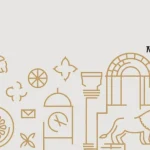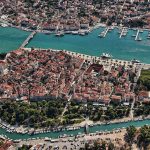March 3, 2020 – TCN meets the modern masters of Trogir in our latest series. Next up, traditional a cappella singing by Klapa Trogir.
In November 2019, Trogir unveiled a new branding strategy, visual identity, and promotional video, becoming the first coastal destination in Croatia to use branding at such a serious and professional level.
https://www.youtube.com/watch?v=v=VRdnDmQSJ_U
The result of the creative process is the slogan “Marked by Masters”, influenced by the continuity of life in Trogir for over 3600 years, the great masters who have operated in Trogir since the Middle Ages, and the indelible traces that these masters leave.
While the medieval master builders, sculptors, and stone-cutters who lived and created in Trogir left their mark through the traces of graffiti around the town, centuries later, we can find Trogir’s modern masters thriving as artists, chefs, jewelers, tailors, and klapa singers, to name a few.
Today, we meet Klapa Trogir, whose traditional a capella folk songs have decorated the squares of Trogir for over half a century.
The narrow arched streets, beneath the Romanesque, Gothic and Renaissance windows and balconies of ancient Trogir, have always echoed the songs of heavyweights, fishers, and sailors. The catchy or rustic tunes marveled wonderfully at the city’s turbulent past. These Dalmatian folk tunes originate from the everyday life of a coastal man whose traces are rooted in the centuries-old singing of folk fraternities of medieval churches. Thus, 56 years ago, Klapa Trogir klapa was borne out of the same environment.
Klapa Trogir was founded in 1964, at the premises of the Kolo Cultural and Art Society, which has cultivated the rich tradition of the Trogir choir since its foundation in 1919. Formed by friends and folk singers who first called themselves ‘Grupa Dalmatinaca’, they were one of the first formally formed vocal bodies of Klapa founded in Dalmatia.
Hoping to prove themselves at the first-ever Omiš Klapa Festival in 1967, Grupa Dalmatinaca needed to change their name in order to perform. After contemplating many stage names, “Oktet Trogir” was accepted.
Oktet Trogir performed folk tunes “Cviće moje”, “Ako si pošla spat” and “Blago, blago” and was awarded the second-largest cash prize by the jury.
https://www.youtube.com/watch?v=v=VJ8-HhR8aeA
A long-time member of the jury, distinguished historian and cultural worker Željko Rapanić reviewed their performance in Slobodna Dalmacija:
“… in the great flood of fabricated pseudo folklore and folk music, nurturing the original Dalmatian song as a musical expression of a particular and independent ethnic medium and ambiance has its deep meaning … in this sense, we would emphasize Oktet Trogir…”
For the next 20 years, Klapa Trogir confirmed its quality by winning twenty awards from the Omiš jury or audience – and in 1986, Klapa Trogir was voted the most successful klapa for the first two decades of the Festival.
Klapa Trogir was conducted by leading music experts of the time, like Josip Veršić, Silvije Bombardelli, Nikolaj Žličar, Nikola Buble, Ljubo Stipišić, Joško Ćaleta, Duško Tambača, and Vladan Vuletin to name a few.
https://www.youtube.com/watch?v=v=x0NTMLI02_s
The size and merit of Klapa Trogir is that by its quality of singing, and especially by its relation to the singing tradition of its region, it has been able to prove its worth at an almost academic level, while preserving traditional songs, which they then recorded and released. Today, the songs are essential literature for any aspiring klapa singer.
The sound of Klapa Trogir, special and inimitable, is the soundtrack to scenes of ancient Trogir, the cathedral and busy squares, parks and terrace gardens, and dawn or dusk reflected on the calm sea.
https://www.youtube.com/watch?v=v=GtRVqMFtnwU
Some say that Klapa Trogir can thank its harmony from the singer’s brotherly bond, which often corresponds to the truth. Namely, from the beginning, the group once boasted brothers Geić, Frana, and Coce.
At the zenith of its Klapa voyage, Klapa Trogir ceased to operate in the first half of the 1990s. After a ten-year hiatus, in 2003, they reunited briefly to celebrate 40 years with performances at Poljud, Lisinski and other concert venues across Croatia.
https://www.youtube.com/watch?v=v=LWQewvOvI6Y
Behind Klapa Trogir is a magnificent opus of Dalmatian folk songs, new klapa compositions, modern popular festival songs and world, classical and sacred compositions of international provenance.
Last summer, Klapa Trogir reunited to take part in the Trogir Cultural Summer program.
“I am delighted to have revived the Klapa song after 30 years in Trogir. We proved that the songs did not die in the city, and that many of our vocals will be performed forever. A lot is going on in Klapa songs nowadays, and you can find yourself singing in odd places, from funerals to weddings, or theaters to stadiums, and the least are sung in streets or alleyways. We think that this should be indigenous singing, it is simply that charm that cannot be extinguished and what made the Trogir Klapa famous,” said Klapa Trogir member Igor Brešan.
Their last concerts were very well received and were designed in three parts. While they most sang a capella, and songs belonging to the locality of Trogir, in the second part, they presented the fun songs of Zdenko Runjić in klapa versions, and in the third, dedicated songs to people who were gone, primarily Nikola Buble and Vinko Coce.
“The concerts were very well received by the audience. There is no makeup artist here, it is sung simply without a microphone, as in the aforementioned streets, very dignified. In the 55th year of existence, we were given a stable team of 10 people who received their first recognition from the President, then we toured in Ljubljana and Čakovec, and now we are going to Norway. The voice of Klapa Trogir really spreads nicely.”
https://www.youtube.com/watch?v=v=cnd4yYvVPv4
At the end of last year, they released a forgotten recording found somewhere in Split, including nine songs that have never been released in over 30 years.
Over the past decades, the Klapa has been enriched by top tenors such as Nikša Bilić Panto in the first line-up, with his seconder, Špire Piteša, and in the second it was Vinko Coce and Zoran Demirović – Čuči. Today, there is Ivo Ostric and Ivo Coce, who will carry on the work of the klapa. The album of lost songs is event nominated for a Porin award – in three categories!
https://www.youtube.com/watch?v=v=EDkMTDM3r54
Many young singers grow up listening to these Trogir tenors and baritones, trying to copy the unique performances of Klapa Trogir. The wonderful voices and interpretations of Vinko Coce, Zoran Demirović – Čuč, Duje Coce, Mario Franić, and Frane Frana, Marinko Rožić and Vlado Rilja, the most famous singers of Trogir, will remain an unattainable model and lasting value of Dalmatian musical tradition.
To read more about the modern masters leaving their mark on Trogir today, as well as the latest from this gorgeous UNESCO World Heritage Site, follow the dedicated TCN Trogir page.
Source: FDK.hr, Trogirski Portal










